If you’re looking for the best Ethereum wallet, you’ll want to know about a wallet’s reliability and trust factor. You’ll want to understand its features and benefits when it comes to security, privacy, ease of use, and overall functionality.
Today, we’ll review some of the top Ethereum wallets in 2025. We’ll assess their strengths and weaknesses and how they stack up against each other to help you decide which is best for you.
Without further ado, in ascending order, here are:
The Best Ethereum Wallet Picks — At a Glance
6. Ellipal Wallet — Air-gapped wallet with offline functionality
5. Tangem Wallet — First ring-design wallet with NFC connectivity
4. Ledger Wallet — Access to over 5K assets and multi-device connectivity
3. Cypherock Wallet — Card-based wallet that doesn’t rely on a seed phrase
2. Zengo Wallet — Anonymous hot wallet generating new addresses for each transaction
1. Best Wallet — Non-custodial wallet with exclusive access to hot presales
What is an Ethereum Wallet?
Ethereum wallets are digital tools used to transact and store Ethereum and ERC-20 tokens.
In layman’s terms, ERC_20 or fungible tokens are identical, transferable assets, unlike non-fungible tokens (NFTs), which are unique and can’t be exchanged on a one-to-one basis. ERC-20 coins can be exchanged for other coins and serve as the subject of smart contracts.
Hot wallets tend to be custodial and enforce a KYC policy. That means a third party keeps your private keys while you have to cough up your private information. Your sensitive personal and financial data can be vulnerable to breaches. On the other hand, hot wallets can be more convenient to use.
Cold wallets are considered more secure and private, given you control your own assets and keys, as they’re not stored on the provider’s platform.
Whether hot or cold, Ethereum wallets are sought-after thanks to their ERC-20 support, giving you access to a pool of thousands of coins and other assets (staking, NFTs).
The Best Ethereum Wallets in 2025 — Reviewed
Below are our picks for the top ETH wallets of 2025, ranked based on privacy, security, convenience, and overall features.
6. Ellipal Wallet

Ellipal is one of the best Ethereum wallets, offering a perfect balance of convenience, security, and privacy.
The Ellipal app, which is the hot wallet bit, supports multiple accounts and coins along with security-related assets from other wallets, such as your private keys, recovery phrases, and NFTs.
The Ellipal hard wallet (Titan or Mini) offers air-gapped cold storage with multi-layered security.
You can also set up passphrases to encrypt your wallet’s contents. This way, even if someone bypasses your PIN (the code that encrypts your device), they still can’t access your wallet without the passphrase.
Ellipal’s Anti-Tamper mechanism is another noteworthy feature. The mechanism triggers in the event of a physical breach and deletes all data to render the wallet worthless.
This is a problem for any would-be crypto thief, but not for you. That’s because you have backup systems in place to restore access to your funds like the private key, seed phrase, and passphrase.
Editor’s Top Feature:
The Secret Secondary Wallet. The feature allows you to use gesture PINs to hide your Bitcoin and Dogecoin accounts. Only you know they exist and how to unlock them.
So, even if someone can access your wallet’s content, your most valuable assets will remain safe.
The hardwallet itself (Titan 2.0 or Titan Mini) is also built with security in mind. The full-metal case with a shock-resistant touchscreen is almost impervious to brute force.
The touchscreen feature is a nice touch (heh), allowing for a smoother user experience.
Ellipal currently supports over 40 chains and more than 10,000 coins, but only five are available for staking: Cosmos ($ATOM), Tezos ($XTZ), Polkadot ($DOT), Kusama ($KSM), and Cardano ($ADA).
Titan 2.0 is priced at $169, and Titan Mini is available at $99. You also get bundles and additional separate products like the Ellipal Seed Phrase Generator (JOY) for $49 or the Ellipal Seed Phrase Steel (mnemonics tablet), also for $49.
| Ellipal Pros | Ellipal Cons |
|
|
5. Tangem Wallet
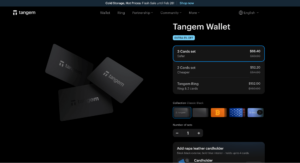
Tangem is an innovative Ethereum wallet that delivers on both the security with simplicity fronts.
The wallet consists of three pieces, a ring, and two additional cards (or three cards), which all function as separate but identical keys.
The smart backup system produces and stores the private key on the three elements only, with no other copies being stored anywhere else.
The three-element system ensures you won’t lose access to your funds, even if you lose one element.
Aside from the Hardware Security Module (HMS) system, Tangem employs additional security tools like biometrics and access codes for the three chips. These security measures are CC EAL6+ verified, which confirms their reliability.
Editor’s Top Feature
The Tangem ring’s slick, minimalist, and robust design definitely takes the cake. Its main features include:
- Resistance to dust
- Tolerance for extreme temperature variations (-25C to +50C)
- Resistance to X-rays and electrostatic and electromagnetic pulses
- Waterproof casing
- No need to charge
The Tangem hard wallet comes with a 25-year warranty, but the ring and cards have been designed to last even longer than that.
Tangem has three product sets:
- $144 – The ring and two cards
- $62.91 – Three cards
- $49.41 – Two cards
You can trade with Tangem in three easy steps:
- Install the Tangem app on your phone
- Whenever you want to open it, remove the ring from your finger and tap the phone
- Enter your PIN (+ biometrics if you have them set up)
You can only open the app if you remove the ring from your finger.
You can purchase two or more ring sets ($144 each) and create backups of your rings if you want even more peace of mind.
Tangem currently supports over 6,000 tokens across 80+ blockchains and allows staking for a growing list of tokens. Only five are available for staking right now: $SOL, $Tron, $MATIC, $BNB, and $ATOM.
Unfortunately, you can only have one address per coin, for now at least.
| Tangem Pros | Tangem Cons |
|
|
4. Ledger Wallet
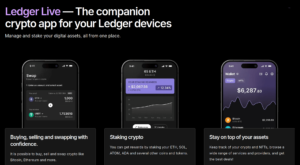
Ledger Wallet ranks as one of the best crypto wallets today thanks to its user-friendly interface, security, and wide range of services and products.
As a hardware wallet, Ledger allows you to control your accounts’ security and assets. This not only offers enhanced security but better privacy too, thanks to the no-KYC policy.
Important note: You’ll need to link your identity (real name, address, etc.) to the Ledger Recover tool, which will let you recover your account if you lose your Secret Recovery Phrase.
When using the recovery feature, two independent companies will verify your identity to prevent errors and malicious takeovers.
However, your personal information won’t be associated with your blockchain activity or Ledger-related transactions.
The Ledger Live app is user-friendly and intuitive, while Ledger devices offer great security features. These include a PIN code limited to three incorrect inputs, the anti-tamper screen, and the need for manual consent before every action.
Ledger currently offers multiple products:
- Ledger Nano S Plus – $79
- Ledger Nano X – $149
- Ledger Flex – $249
- Ledger Stax – $399
In addition to the base hardware wallets, you can also choose from a variety of accessories like:
- Ledger Recovery (digital backup) – $110 / year
- Cryptotag Zeus (titanium case for seed phrase storage) – $150
- Limited Edition AMBUSH Liquid Metal Case (protective case for Ledger Stax) – $500
Editor’s Top Feature
Ledger’s commitment to enhancing the user experience. Optional tools like Ledger Recover, Ledger Security Key, and Ledger Sync streamline cross-device connectivity, security, and privacy.
Products like Ledger Stax are cutting-edge tools, thanks to features like the modern design, secure touchscreen, and the Near Field Communication (NFC) technology.
Just a heads-up. Ledger’s TrustPilot overall review sits at a gloomy 1.7/5, based on 1.9K reviews.
Many negative reviews invoked issues like transaction errors and delays, poor customer support, or devices incompatible with newer updates (Nano S specifically).
That being said, Ledger replies to all reviews, good or bad, providing assistance and clarifications.
| Ledger Pros | Ledger Cons |
|
|
3. Cypherock Wallet
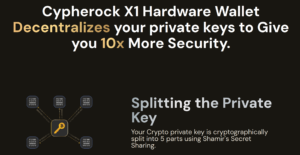
Cypherock is one of the safest Ethereum wallets thanks to its multi-layered security system.
The first is Shamir’s Secret Sharing (SSS) protocol, which comes with several advantages over the standard multi-sig protocol. That’s because it breaks the private key into five cryptographic parts; the X1 vault plus the four X1 cards.
Losing up to three of the five chips doesn’t mean losing access to your funds, as you can use the remaining two to restore access.
Cypherock is also BIP39-compatible and seedphrase-less.
It also allows for multi-wallet account imports like Trezor, Ledger, and Metamask, letting you manage your entire crypto portfolio in one place.
CySync, Cypherock’s trademark app, is user-friendly and allows you to manage up to four wallets simultaneously. That said, the platform only supports some 10 blockchains for now.
Editor’s Top Feature
The Estate Recovery feature. This functions as a life insurance policy, letting you appoint an heir to receive your crypto assets in case of death.
The process is almost automatic and functions like this:
- Select up to four wallets under the Estate Recovery plan and set up the authorization email (which the other party can also access)
- Add the other party as a nominee in CySync and give them an X1 card
- Set up a final message and a reminder time between one and six months. When the time expires, the Cypherock system will remind you to set up another date daily for 30 days.
If you don’t reset the time during the 30 days, the system will communicate the location and PIN of the other card(s) to the other party, which they can use to recover the seed phrase.
Cypherock supports all BIP39-compatible wallets, such as Trezor, Ledger, Metamask, Exodus, Bitbox, and more. You’ll also get access to multiple DApps like Gnosis, Uniswap, and Lido through the WalletConnect integration.
It also comes with an extensive FAQ section, providing you with an encyclopedia of information, including in video format.
The Cypherock device comes with an OLED display and a thumb joystick and is available for $131.67. The package contains the X1 Vault, the four X1 cards, and the hard case.
| Cypherock Pros | Cypherock Cons |
|
|
2. Zengo Wallet

Zengo’s Private Transaction Mode ranks as one of the best privacy and security measures in the crypto space.
The HD protocol enhances your privacy by generating a new address with each Bitcoin or Dogecoin transaction.
This makes it extremely difficult for any malicious third party to track your transactions back to you. More importantly, all of these addresses remain valid, so you can still use them.
Zengo comes with other security measures as well, such as:
- Multi-Party Computation (MPC): MPC breaks your private key into shares (one on your device and one on Zengo’s servers). This eliminates the single point of failure of seed phrases. If one share fails due to hacking, loss, or system failure, you can still access your funds.
- The Recovery Kit: The standard Recovery Kit requires the 2FA protocol, while Zengo Pro ($19.99 / month) requires a 3FA system (recovery file + email + 3D FaceLock biometrics).
- Web3 Firewall: This places on-chain transactions into one of three risk levels: green, yellow, and red, based on their behavior and profile.
Zengo has a clean user interface (UI), making it beginner-friendly and intuitive. You can perform your standard buy-swap-sell transactions on the fly and manage your accounts with ease.
You can also import NFTs to your NFT gallery and choose your favorite dApp from the many options available.
These include OpenSea (the largest NFT marketplace), Uniswap (the most popular DEX), and MetaMask Swap (privacy-focused crypto space).
Zengo also offers the Legacy Transfer feature, which is similar to Cypherock’s Estate Recovery discussed above. Essentially, it lets you set up an inheritance-type system that would transfer ownership of your assets to your designated party.
Editor’s Top Feature
The Bitcoin Vault. You can create an ultra-secure Bitcoin vault with security measures like biometric authentication and whitelisted addresses.
The TimeLock optional feature locks your bitcoins inside the vault for a set amount of time, so not even you can withdraw them. This is great when you’re traveling, for instance, and fear losing or having your mobile device stolen.
Plus, the Bitcoin vault is hidden, so it won’t show in your normal wallet balance, adding an additional layer of security.
Zengo currently offers two plans:
- Zengo Essentials: Free and comes with 3FA and the NFT spam filter
- Zengo Pro: $19.99 pm for the full package with features like Legacy Transfer, Web3 Firewall, priority customer support, and up to five segregated wallets.
Zengo supports little over 380 coins and offers staking for only two: Tezos and Ethereum.
| Zengo Pros | Zengo Cons |
|
|
1. Best Wallet

Best Wallet takes the #1 spot on our list of non-custodial Ethereum wallets for its Market Insights feature, which keeps you updated on the performance of trending tokens and the market’s daily movements.
Also, as a decentralized platform (DEX), Best Wallet’s non-custodial nature puts you in charge of the wallet’s security and assets. This means your assets aren’t stored on the platform’s server but on your own device.
You also own and control the private key. This translates into improved security by drastically reducing the risk of hacking and private key leaks.
The shares communicate with each other every time you use your private key to send crypto. This ensures your funds’ safety even if one share is leaked or corrupted due to system failure.
Best Wallet’s UI aims for maximum efficiency and ease of use. Everything is one click away, from the standard operations (buy, sell, swap, send, receive, history) to your balance and updates on the hottest presales.
Editor’s Top Feature
The Token Launchpad feature. Best Wallet advertises upcoming presales, which you can invest in before they go public. This has the potential to offer great ROI (Return on Investment) once the coins go live.
The Token Launchpad also provides you with critical information about the presale, including capital raised, token price, roadmap, and launch date. You can purchase and hold the presale tokens directly on the Best Wallet app for a streamlined process.
Best Wallet offers access to most blockchains and is free to use, so it costs nothing to test it out and see if you like it.
Best Wallet also has its token on presale, which looks set to take off following its public listing. You can check our $BEST price prediction if you’re interested in investing.
| Best Wallet Pros | Best Wallet Cons |
|
|
How We Chose the Top ETH Wallets
We took several factors into account when looking for the best ERC-20 wallet. These are:
How to Use an ERC-20 Wallet – Step-by-Step Guide
Setting up a crypto wallet is a fairly straightforward process, but this also depends on the type of wallet you’re using.
Let’s use one of the easiest-to-use and safest Ethereum wallets, Best Wallet, as an example.
1. Download the Best Wallet App
Go to the Google Play or Apple Store and download the official Best Wallet app.
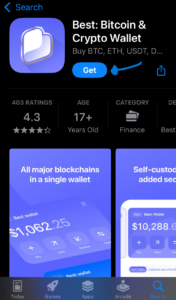
2. Setup Your Account
When setting up your account, you can sign in with your Google or Apple account or create a new one on the spot. Either way, make sure that the email account is properly secured (2FA, biometrics, backup email, etc.)
3. Set Up the Passcode
Once your account is created, set up the passcode to secure your wallet. Don’t forget to enable biometrics as well by checking the ‘Enable Face ID to log in’ box.
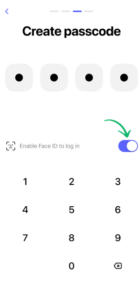
4. Enable Push Notifications
This is an optional step, but it’s worth it. This way, Best Wallet will inform you of new features, updates, and customer support messages that may interest you.

5. Start Using Your New Best Wallet
You’re now ready to start using Best Wallet to trade crypto. Navigate within the app to discover the tools at your disposal and explore Best Wallet’s blog articles and video tutorials to familiarize yourself with the platform.
Findings
Today, we’ve reviewed some of the best Ethereum crypto wallets on the market in terms of security, privacy, ease of use, and general features.
While we found there’s no shortage of crypto wallets on the market, they vary drastically in terms of reliability and trustworthiness.
Our top contenders all excel when it comes to security and privacy, supported coins, package prices, staking, and reputation.
Even so, Best Wallet comes out on top if you’re looking for an easy-to-use, non-custodial hot Ethereum wallet, while Ledger has some of the most robust security features for a cold wallet.
That being said, you should always DYOR before using any service and investing in any project. Caution goes a long way when diving into an ecosystem as volatile as the crypto market.
Frequently Asked Questions About Ethereum Wallets
1. Is it worth using an Ethereum wallet?
Yes, it’s totally worth using a secure Ethereum wallet like Zengo or Tangem. That way, you’ll be free to transact Ethereum and ERC-20 tokens, opening the door to a crypto pool worth billions.
2. What Ethereum wallet to use in 2025?
We recommend Best Wallet as one of the most versatile and user-friendly hot wallets for Ethereum. It gives you direct access to the entire ERC-20 market, as well as Bitcoin, BNB, and most other chains.
Zengo and Cypherock are also solid picks if you’re looking for Ethereum wallets with strong security, privacy, and user-friendly features.
3. What is the best Ethereum wallet for offline storage?
Ellipal currently ranks as one of the best Ethereum wallets for offline storage thanks to its air-gap feature. Air-gapping means the wallet remains entirely offline, even when processing transactions.
Instead of the standard information transfer channels (USB, Wi-Fi, Bluetooth, etc.), Ellipal relies on QR codes to process transactions. Other than that, your assets and private key are stored offline 100% of the time.
4. Which Ethereum wallet is best for NFTs?
Cypherock is one of the best NFT-supporting Ethereum wallets, thanks to its NFT gallery and NFT spam filter.
5. Can I use an ERC-20 wallet to store other cryptocurrencies?
Yes, you can. Multi-chain wallets like Best Wallet, Zengo, Cypherock, and Ledger support both ERC-20 tokens and numerous other top trending cryptocurrencies.











































